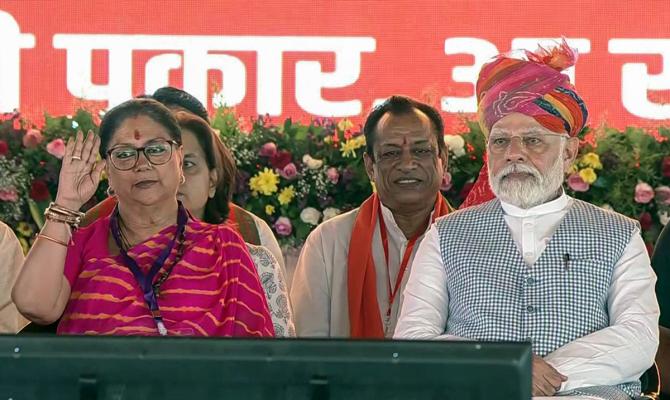Vasundhara Raje may have had her faults but she is an unconventional and brave leader who deserves better, observes Aditi Phadnis.

Paradoxes abound in politics. Here's one: Is there such a thing as a politician becoming too popular?
As former Rajasthan chief minister and Bharatiya Janata Party leader Vasundhara Raje surveys the debris around her, this could be one of the questions she's asking herself.
Many of her core supporters -- like five-time MLA Narpat Singh Rajvi, the late chief minister Bhairon Singh Shekhawat'S son-in-law -- were missing from the first list of BJP candidates in the upcoming assembly elections in the state. (Rajvi was accomodated in a subsequent list, but given a different constituency to contest from.)
You don't have to be a rocket scientist to work out that this is a stratagem by The Powers That Be to cut Ms Raje's wings.
The people might like you. But if you don't have a support base within the party, your political heft reduces considerably.
The man who disproved this was Shekhawat, the legendary BJP magician in Rajasthan who could manufacture a majority out of thin air without splitting any party.
Shekhawat had few -- actually no -- enemies. And yet, under his leadership, the BJP never managed to cross 100 on its own. Look at the numbers.
Shekhawat became chief minister for the first time in 1977. The Janata Party, into which the Jana Sangh (the BJP's previous incarnation) had merged itself, got 150 out of the 200 seats.
The 1990 assembly election saw the BJP get 84 but it managed to form the government with support from the Janata Dal.
And in 1993, the BJP got 95 seats, but cobbled together a 124-seat coalition.
These elections taught Shekhawat the importance of having invisible friends -- and keeping the party high command guessing while simultaneously putting a value to political arbitrage.
It was a reluctant Vasundhara Raje who moved from Atal Bihari Vajpayee's PMO, (she was minister of state), to Jaipur as BJP chief in 2002.
But under her leadership, the party stormed to power in 2003, getting 123 seats.
In the 2013 assembly elections she improved the party's tally to 163 -- stupendous by any standard.
The BJP now needed no friends, invisible or otherwise.
Everything went well initially. She was also finance minister, and when she presented her first ever Budget in 2004, she read out a sher: 'Aandhiyon se keh do zara aukaat mein rahein/hum paron sey nahin, hausalon se uda karte hain (tell the storm to stay in limits/we soar high on the strength of our conviction, not our wings)'.
It could have been Vasundhara Raje on Vasundhara Raje.
When she took over, Rajasthan's fiscal deficit was 6.6 per cent of state gross domestic product (financial year 2003-2004). By 2007-2008, this had come down to 1.75 per cent.
She launched a programme to digitise access to public services. Infrastructure was strengthened via Japanese investment.
An automobile manufacturing zone in Bhiwadi, where Honda cars set up a facility, the Delhi-Mumbai Infrastructure Corridor set the impetus for overall improvement in road infrastructure ... By then, she had developed the confidence to ignore criticism: The people who criticised her were to blame, not her work.
Old friend and advisor the late Jaswant Singh sent messages of counsel, but got it in the neck when in 2007, the state government filed a case under the Narcotics, Drugs and Psychotropic Substances Act against Singh and nine others for allegedly using opium as part of a ceremonial ritual.
It is in the second term that serious problems began. One of them was called Lalit Modi. Another was called corruption. The third related to complaints of MLAs about lack of access.
This overtook the serious reform work she did: Rewriting labour laws, the invitation to the private sector to invest in Rajasthan, power-sector reform, welfare schemes like the Bhamashah health and social security scheme, and so many others.
And here's the paradox: In 2018, Vasundhara Raje was at the peak of her performance and a face easily recognisable across Rajasthan.
The BJP had so many MLAs that it was hard to recognise and address all of them.
But within the party a whisper campaign had started: She was trying to bracket herself with Narendra Modi.
Adulation by fringes in the party about 'Vasundharanomics' was not helpful.
As always, perception shaped reality. A farmer agitation in Sikar was not handled properly and went out of control.
The loss of two Lok Sabha by-elections, in Ajmer and Alwar (2017), boosted Sachin Pilot's stock in the Congress but did little to win her any sympathy.
The RSS, never especially fond of her, let her stew in her own juice.
She contested against Jaswant Singh's son Manvendra (who had joined the Congress by then) in the Jhalrapatan assembly seat in 2018.
The surprise was not that she won the seat but the margin -- just 30,000 votes -- was small for a chief minister.
By now the party's alienation from her was too deep to correct.
And maybe Vasundhara Raje was too proud to ask for help. Others, like Gajendra Shekhawat, stepped in the breach.
And now, by denying her supporters the ticket, the party is signalling that it is ready to put her out to pasture.
And so, is there a point when politicians become too popular? Should Ms Raje have emulated Manipur's Birendra Singh, who is apparently so popular that the BJP just can't do without him? Hard to say.
Vasundhara Raje may have had her faults, but she is an unconventional and brave leader who deserves better.
Feature Presentation: Aslam Hunani/Rediff.com











